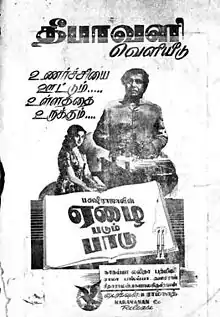Ezhai Padum Padu
Ezhai Padum Padu (transl. Plight of the Poor) is a 1950 Indian Tamil language film directed by K. Ramnoth. It was simultaneously shot in Telugu as Beedala Patlu. It was an adaptation of Les Misérables, Victor Hugo's 1862 novel. The film was released on Diwali day, 1950 and was a hit. For his memorable portrayal of Inspector Javert in this film, N. Seetharaman came to be called as Javert Seetharaman. It was produced by S. M. Sriramulu Naidu of Pakshiraja Studios.[1][2][3][4]
| Ezhai Padum Padu | |
|---|---|
 Theatrical release poster | |
| Directed by | K. Ramnoth |
| Produced by | S. M. Sriramulu Naidu |
| Screenplay by | Elangovan |
| Story by | Sudhanandha Bharathiar |
| Based on | Les Misérables by Victor Hugo |
| Starring | V. Nagaiah Lalitha Padmini |
| Music by | S. M. Subbaiah V. Nagaiah (supervision) |
| Cinematography | N. Prakash |
| Edited by | Surya |
Production company | |
| Distributed by | Narayana & Co. Ltd |
Release date | 6 November 1950 |
Running time | 197 minutes |
| Country | India |
| Language | Tamil Telugu |
Production
Ezhai Padum Padu (lit. Plight of the poor) was produced by S. M. Sriramulu Naidu at Pakshiraja Studios in Coimbatore. K. Ramnoth was hired as the director and Chittor V. Nagaiah was cast as Kandan (based on Jean Valjean). Initially, Nagercoil K. Mahadevan, was cast as the bishop who reforms the thief. But after a few scenes were shot, Sriramulu Naidu replaced him with Serukulathur Sama. Elangovan (Thanigachalam) wrote the script for Ezhai Padum Paau based on Sudhanandha Bharathi's translation of Les Miserables.[5] Sriramulu Naidu was known for his strict schedule. Once when director Ramnoth was absent from the set, one of the actors - V. Gopalakrishnan - left the set thinking that there would be no filming on that day. An incensed Naidu, filmed the scene (a love song sequence) using a female actress (Ragini) dressed up as a man instead of Gopalakrishnan.[1]
Plot
Tough and ruthless Police Inspector Javert (Javar Seetharaman) recaptures a small-time criminal Kandhan (Chittor V. Nagaiah) who has escaped from prison. Kandhan turns a new leaf with the help of a Christian Bishop (Serukulathur Sama). When he is released from prison he starts a glass making company. He changes his identity and becomes successful. He becomes the mayor of his town. Inspector Javert finds out about his new life and threatens to expose him. On one occasion Kandhan saves Javert's life. Javert commits suicide unable to turn Kandhan in to the authorities out of his sense of gratitude.
Cast
Cast according to the opening credits of the film
K. S. Kanaiah, S. V. Shanmugam Pillai, S. V. Shanmugam, V. S. Rao, Manickam |
|
Reception
The film was released on Deepavali day (6 November), 1950 at 'Casino' cinema, Madras. It was a commercial and critical success.[1]
Soundtrack
The soundtrack had ten songs composed by S. M. Subbaiah Naidu. The lyrics by V. A. Gopalakrishnan. The singer is Chittor V. Nagaiah. Playback singers are M. L. Vasanthakumari, P. A. Periyanayaki & Jayalakshmi and Thiruchi Loganathan.
- Tamil Soundtrack
| No. | Song | Singers | Length (m:ss) |
|---|---|---|---|
| 1 | "Yauvanamae Aahaa Yauvanamae" | M. L. Vasanthakumari | 02:19 |
| 2 | "Oo Kiliye Aasai Kiliye" | P. A. Periyanayaki | 01:21 |
| 3 | "Vaanamudhe Ondraai" | Thiruchi Loganathan, M. L. Vasanthakumari & P. A. Periyanayaki | 05:28 |
| 4 | "Kannan Mananilaiyai Thangame Thangam" | M. L. Vasanthakumari | 03:25 |
| 5 | "Kanivudan Thirumbiye Paarum" | P. A. Periyanayaki | 03:12 |
| 6 | "Ennaasai Paappa" | Chittor V. Nagaiah | 01:54 |
| 7 | "Vidhiyin Vilaivaal Anaadhi Aanaen" | Radha Jayalakshmi | 03:13 |
| 8 | "Vaazhvu Malarndhadhuvae" | Chittor V. Nagaiah | 03:08 |
| 9 | "Oo Mathana" | Thiruchi Loganathan, P. A. Periyanayaki | 01:48 |
| 10 | "Raaniye Vaaniye" | Thiruchi Loganathan, M. L. Vasanthakumari | 02:23 |
| 11 | "En Bhaagyame Inimel Saubhagyame" | Radha Jayalakshmi | 02:31 |
- Telugu Soundtrack
- "Chinnari Paapa" (Lyrics: Aarudhra; Singer: Chittor V. Nagaiah)
- "Sarasaku Radelane" (Lyrics: Aarudhra; Singer: M. L. Vasantha Kumari)
- "Yavvaname Aha Yavvaname" (Lyrics: Aarudhra; Singer: M. L. Vasantha Kumari)
Remake
This film was remade in Telugu in 1972 with the same name, directed by B. Vittalacharya.[6]
References
- "Blast from the past – Ezhai Padum Padu 1950". The Hindu. 2 November 2007. Archived from the original on 12 August 2014.
- Baskaran, S. Theodore (1996). The eye of the serpent: an introduction to Tamil cinema. Chennai: East West Books. pp. 69, 106.
- Rajadhyaksha, Ashish; Willemen, Paul (1994). Encyclopaedia of Indian cinema. British Film Institute. p. 147. ISBN 0-85170-455-7, ISBN 978-0-85170-455-5.
- Hardy, Phil (1997). The BFI companion to crime. University of California Press. p. 180. ISBN 0-520-21538-9, ISBN 978-0-520-21538-2.
- Vamanan (3 November 2018). "In Tamil cinema, copyright has meant copying left, right and center". Inmathi. Archived from the original on 27 December 2018. Retrieved 2 January 2019.
- https://www.imdb.com/title/tt1502777/